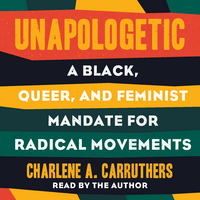You need to sign in or sign up before continuing.
Take a photo of a barcode or cover
270 reviews for:
Unapologetic: A Black, Queer, and Feminist Mandate for Radical Movements
Charlene Carruthers
270 reviews for:
Unapologetic: A Black, Queer, and Feminist Mandate for Radical Movements
Charlene Carruthers
A good example of praxis, particularly if you are from Chicago
challenging
hopeful
reflective
fast-paced
challenging
hopeful
informative
inspiring
reflective
medium-paced
informative
medium-paced
this book is, simply put, incredible. i’ve never heard of Carruthers before or the BYP100, but the title as well as the synopsis was what piqued my interest.
if you’re looking out in the world and wondering what is going on and how we got here, please pick this book up. this took me over a week to read because i had so much to chew on and consider, so many things that i learned about and had never heard of before, like Black womens’ forgotten roles in the Civil Rights era, MLK’s friend and fellow activist Bayard Rustin (who was a gay Black man), Rosa Parks’s investigation and support of Recy Taylor, and the revolt of Haiti.
i would recommend this book for people already familiar with leftists ideas, are open to criticizing liberals and white progressives, and are hungry for more change than what our current patriarchal, white supremacist country can offer. there are a lot of terms that can go over people’s heads, so i would scale this as a “medium” in terms of informative, radical texts.
this short manifesto is powerful, thought-provoking, and of course unapologetic.
if you’re looking out in the world and wondering what is going on and how we got here, please pick this book up. this took me over a week to read because i had so much to chew on and consider, so many things that i learned about and had never heard of before, like Black womens’ forgotten roles in the Civil Rights era, MLK’s friend and fellow activist Bayard Rustin (who was a gay Black man), Rosa Parks’s investigation and support of Recy Taylor, and the revolt of Haiti.
i would recommend this book for people already familiar with leftists ideas, are open to criticizing liberals and white progressives, and are hungry for more change than what our current patriarchal, white supremacist country can offer. there are a lot of terms that can go over people’s heads, so i would scale this as a “medium” in terms of informative, radical texts.
this short manifesto is powerful, thought-provoking, and of course unapologetic.
Fantastic. Educational, inspiring, and validating for movement leaders and activists.
A concise primer and mandate for the need to center black feminist theory and practice in liberation movements.
This book took a while for me, as is should. I took a deep dive. Reading and rereading passages. Underlining, taking notes, doing work. As a white cis woman, this is critical reading to better center myself in the communities I work in as a counselor. I am appreciative that I have had the opportunity to open my eyes wider and see how I am moving in the work to empower and support POC and Queer communities. This is not a read and shelf book. This is a text that will continue to center me and be a reference point.
This was probably my most challenging read in recent years. I found myself having to constantly stop and unpack my negative responses to what the authors were saying. Not because of the subject matter or intent but due to the language that they used.
I found I automatically started to dismiss things because they used terms like "radicalized" and "comrade."
I realised that I was responding automatically to much of the very valid things being said in a negative way because of biases around the words being used and not the message being shared.
It took me longer to read through this book than expected, and it was mentally exhausting having to constantly combat word biases, but it was definitely worth the effort.
I found I automatically started to dismiss things because they used terms like "radicalized" and "comrade."
I realised that I was responding automatically to much of the very valid things being said in a negative way because of biases around the words being used and not the message being shared.
It took me longer to read through this book than expected, and it was mentally exhausting having to constantly combat word biases, but it was definitely worth the effort.
This book provided useful perspective. I appreciate Carruthers' premise about the need to center black, queer, and feminist thinking and voices in liberation movements, and I learned several new historical details (for example, the role of Bayard Rustin, a gay black activist, in organizing the March on Washington; the struggles of Haitian revolutionaries against colonialist and capitalist oppression). However, Carruthers doesn't delve very deeply into any topics (which she acknowledges) so some pre-knowledge would help and unfortunate my lack thereof hindered me. Her clarity on her own self-education and continual drive to evolve and creatively solution would be beneficial to other organizers though.






